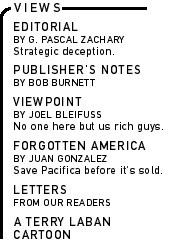

|

|

|

|
| |
|
|
|
Tyson Foods is the biggest seller of chicken in the world. And in an industry that is known for severe labor violations, it could also be considered the worst. Chicken consumption has more than doubled in the United States over the past 20 years, and industry profits have risen more than 300 percent. But the prosperity the poultry industry is enjoying hasn't affected workers. Real wages for the approximately 250,000 poultry workers in the United States have remained stagnant over the past decade, with average earnings of $6.74 an hour. The industry is almost completely controlled by five major corporations, who set labor and wage standards with little fear of competition. Jobs at Tyson are so dangerous, strenuous and low-paying that the turnover is around
ations of the Year" by Corporate Crime Reporter, based on seven worker deaths, fines from the Occupational Health and Safety Administration in several states, and other labor violations. Tyson has a long history of union- Tyson workers each put in hundreds of hours of overtime a year, partly because they are not paid for the lengthy process of putting on, removing or cleaning their required protective gear. In June, 6,000 workers signed on to a lawsuit in Alabama charging Tyson with violations totaling at least $100 million a year in unpaid labor. This is nothing new: A recent Justice Department study showed that 100 percent of poultry corporations in the United States are guilty of wage and hour violations. Jill Cashen, spokeswoman for the United Food and Commercial Workers (UFCW) union, notes that at least 50,000 of Tyson's roughly 60,000 workers could be eligible to join the lawsuit. In January, Tyson subpoenaed all poultry-industry-related records from a variety of religious, social justice and labor groups, claiming the documents are necessary for their defense in the Alabama case, even though some of the groups aren't even plaintiffs in the lawsuit. Representatives of these groups see the move as a strong-arming tactic meant to intimidate opponents and burden the resources of these grassroots organizations. "This isn't about their defense," says Leone Jose Bicchieri of the National Interfaith Committee for Worker Justice. "We're not even a party in the lawsuit. This is just an excuse for them to find out what we have on them." (Tyson spokesman Ed Nicholson declined to comment for this story.)
|


